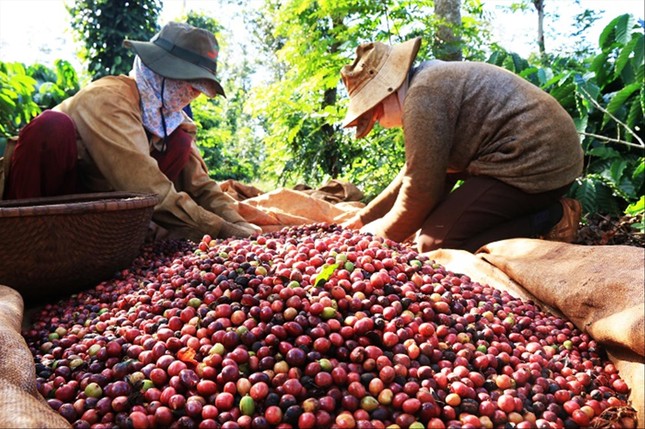According to a survey by PV Tien Phong, coffee prices in the country have continued to surge in recent days. The average price of domestic coffee on April 22 was purchased at 122,500 VND/kg.
In Dak Nong, the coffee price has even reached 124,000 VND/kg and is projected to continue rising. Since the beginning of the year, domestic coffee prices have nearly doubled, reaching a record high for this commodity.

Record coffee price increases have exporters worried
According to the Vietnam Coffee and Cocoa Association, in the 2022-2023 coffee crop year, Vietnam had to import 200,000 tons of coffee due to a shortage of domestic supply. Coffee exports in the first half of April 2024 reached 80,781 tons, a decrease of 3.9% compared to the same period in 2023.
Along with coffee, black pepper prices have also risen to unprecedented levels. In Dak Lak, the pepper price on April 22 was traded at 98,000 VND/kg, while in Gia Lai it was 97,000 VND/kg. In the Southeastern region, the pepper price in Dong Nai was 96,500 VND/kg, in Binh Phuoc it was 98,000 VND/kg, and in Ba Ria-Vung Tau it was 98,000 VND/kg. In the past week alone, the pepper price has increased by 7,500 – 9,000 VND/kg, bringing it close to a record high of nearly 100,000 VND/kg.
Speculation suspected?
In an interview with PV Tien Phong, Nguyen Nam Hai, Chairman of the Vietnam Coffee and Cocoa Association (Vicofa), said that the sharp increase in coffee prices, surpassing the record high, was due to the impact of the El Nino phenomenon, which has caused drought and crop failures in coffee-growing regions around the world. In Vietnam alone, coffee production in the 2023-2024 crop year (from October of the previous year to September of the following year) is estimated to have decreased by about 10%.
In addition, ongoing military conflicts around the world, particularly in the Red Sea region, have pushed up shipping costs for coffee to Europe, the world’s largest coffee consumer. Notably, in the international financial market, many investors are choosing coffee (after oil and gold) as an investment, leading to a surge in coffee prices.
“In Vietnam, due to forecasts that future supply and demand will be affected by climate change, leading to a shortage of coffee supply in Vietnam, businesses, agents, and speculators have started to stockpile goods, pushing up coffee prices,” said Hai.
Phan Minh Thong, Chairman of Phuc Sinh Group, said that the surge in coffee prices has caught businesses off guard, as signed contracts oblige them and foreign companies to continue purchasing for delivery. Currently, businesses are losing tens of millions of VND per ton of coffee, with hundreds to thousands of tons of contracts still to be fulfilled.
According to Thong, the situation is caused by hoarding. Large speculators are holding back supply, leaving most traders unable to deliver to businesses, triggering a “domino effect” that has led to export businesses defaulting on contracts, resulting in losses or having to pay deposits.
As for black pepper, prices have remained high in the first four months of the year, even during the harvest season. The Vietnam Pepper and Spice Association (VPSA) believes that the price increase is partly due to reduced supply and currency fluctuations, but the main reason is speculation, which has led to a surge in black pepper prices in recent times.
According to VPSA, black pepper is often intercropped with coffee, so the prices of the two commodities are closely related. Typically, farmers will sell coffee when prices are high to prepare money to stock up on black pepper .
This year, with coffee prices soaring, farmers are also holding back pepper in the hope that prices will rise as high as coffee, resulting in low supply. Agents and some businesses are also hoarding goods, waiting for pepper prices to rise before selling, further exacerbating the market shortage.












